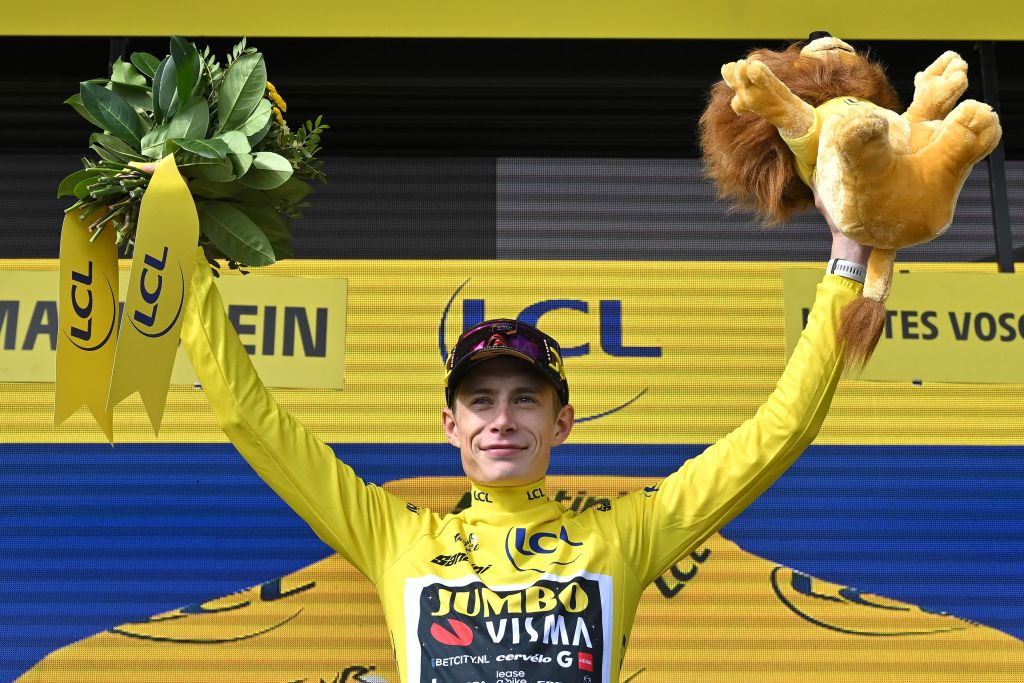
Even after two straight Tour de France victories, Jonas Vingegaard seems as unknowable now as he did when he first announced himself at this race in 2021. He turns up, he performs, he doesn't say a whole lot, and he goes home.
Two years ago, when Vingegaard was unexpectedly ushered into a leadership role at Jumbo-Visma following Primoz Roglič's early abandon, reporters scrambled to flesh out the neophyte's back story.
They pounced gratefully on the detail that he had worked at a fish factory in Hanstholm before making the leap to the WorldTour, and Vingegaard patiently and politely talked them through the details. "I didn't cut the fish: I was the guy who put it in ice and made it ready for them to cut the fish," he explained.
Since then, and though his status has grown immeasurably, it's difficult to say that the world has learned a great deal more about Vingegaard beyond his love for the quiet life with his young family. His social media footprint is light and media access is tightly controlled outside of races. In press conferences, he rarely uses twenty words when three will do.
Vingegaard is not the first enigma to dominate the Tour, and there are mild shades of Miguel Indurain about his reserved nature, but his apparent lack of interest in controlling the narrative is striking all the same. When he opted to miss the Tour of Denmark last August, for instance, it prompted speculation he was suffering from burn-out after his Tour victory. His silence only served to amplify the murmurs, but he didn't feel any need to rush to correct the record at the time.
After sealing his second straight Tour by placing third behind Tadej Pogačar (USA Team Emirates) on stage 20 to Le Markstein on Saturday, Vingegaard dismissed the idea that he had struggled with the weight of his first title a year ago. There was no trace of irritation in his voice as he did so, it seemed more like a simple statement of fact.
"As I have said many times before, I didn't have any problems last year," Vingegaard said after taking a seat in the press tent. "I just chose to take it really easy and relax. I wasn't having any problems at all. It wasn't hard for me, so I assume it will be the same this year."
Vingegaard speaks in the same guarded way now as he did when he first emerged as a Tour contender two years ago, but he suggested that his belief in his own means had grown considerably since that break-out season when he rose so dramatically in the stage racing hierarchy at Jumbo-Visma.
"Two years ago, it was my first Tour de France, and it was the first year where I started to deliver results," he said. "It's not that I was not a good bike rider before, but before I wasn't able to handle the pressure, which I mostly put on myself. I learned to handle this. From that moment, I started getting on podiums and I started winning. Then you get more confidence within yourself and with the media."
Pogačar
Vingegaard certainly wasn't lacking in confidence on this Tour, the third instalment of his ongoing duel with Pogačar, and a sound defeat at the Slovenian's hands in their head-to-head contest at Paris-Nice in March seemed to do nothing to knock Vingegaard off his stride.
After dominating the Critérium du Dauphiné in June, he arrived at this Tour as the joint favourite with Pogačar, and he proceeded to move into the yellow jersey in the opening week. On the first rest day, Vingegaard suggested Jumbo-Visma had a plan to "break" Pogačar, and he repeatedly suggested their duel would ultimately be decided by minutes rather than seconds. So it proved. Thanks to supersonic displays in the Combloux time trial and on the Col de la Loze, Vingegaard rides into Paris on Sunday with a lead of 7:29 over Pogačar.
"Last year, I had a lot of injuries and sickness in the Spring, and this year I didn't have anything, which makes a big, big difference," Vingegaard said. "I'm still developing and I'm still getting better and better. But it's not like I improved 20% in a year. I'm slightly better than last year, but it's not like I'm way better than last year."
Vingegaard remained coy on precisely what Jumbo-Visma's grand, Pogačar-breaking strategy had been – "We have our plan and if we say how to crack him, he will be able to prevent it" – but he hailed the way his team had controlled the race and dictated the terms of engagement on so many occasions.
"We knew my strengths and we knew how to get the best out of my strengths," he said. "I think not everyone understood our plan every day, but we understood it ourselves. In the end, it paid off."
In years past, the Tour winner's traditional Saturday evening press conference has stretched beyond half an hour in length. Vingegaard's clipped responses, by contrast, meant his spell in the press room lasted eleven minutes or so. As ever, it was hard to say the interaction had shed any particular light on what drives him, but he made it clear he would be back to win it all again next year.
"I also have different goals, but the Tour de France is the biggest race in the world," Vingegaard. said. "For me, the Tour de France is just something special and I'll probably try to win it again next year."







